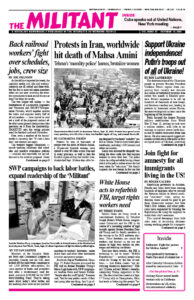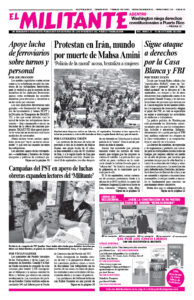Over a week after Hurricane Fiona made landfall in Puerto Rico Sept. 18, most of the U.S. colony was still without electricity, and 25% still had no drinking water. The privately owned electric company says that by Sept. 30 it “expects” between 77% and 91% will have their power restored. That would still leave tens of thousands of families without electricity.
“This is not a case of a natural disaster,” Movimiento de Solidario Sindical union representative José Rodríguez Vélez told the Militant by phone on his way from Mayagüez to Las Marías Sept. 24. He went there to make sure members of the union federation, which organizes workers at companies such as Coca-Cola and Pepsi, were all OK.
“It’s a disaster because we are a U.S. colony and we don’t even have control,” over how federal emergency funds are spent, he said. Fundamental decisions are not made in San Juan, Puerto Rico, but in Washington, D.C.
Fiona was barely a Category 1 storm, compared to 2017’s Hurricane Maria, which was a Category 4. While Fiona’s winds devastated much of the island’s banana crop and flooding damaged hundreds of homes, most of the island was unscathed. Nonetheless, electricity and water went out everywhere. And in the absence of action by authorities in Puerto Rico or in Washington, working people and others have been organizing to bring food and supplies to those most in need.
“The government wasn’t prepared,” Rodríguez said. Luma Energy, the U.S.-Canadian company that runs electrical distribution, “doesn’t want to spend any money. It just wants to get richer.”
Many supermarkets and other business were still closed as of Sept. 27 because they can’t get diesel for backup generators. Gov. Pedro Pierluisi claimed that there was plenty of diesel, but there were “problems” with distribution.
“There are few open gas stations here,” Rodríguez said. “And those that are open have lines of 80 or 90 cars. It’s chaos.”
Decades of crisis
The electrical system has been in crisis for decades, a result of mismanagement by the bosses of PREPA, the government electric power authority. Money it raised through loans and bond sales wasn’t used to maintain or modernize electrical production. But they added to the massive debts the colonial regime foisted on working people. PREPA’s debt stands at $9 billion, including $4.9 billion owed to the employees pension fund.
In 2021 the colonial government gave a 15-year contract to Luma to run the electrical transmission grid. The company refused to honor the union contract with UTIER, which organizes electrical workers, and insisted the workers had to reapply to work there without a union. The overwhelming majority refused.
UTIER called a press conference Sept. 23 demanding that the government bring back thousands of linesmen and other workers who had been pushed out by Luma, to speed the restoration of the electrical supply.
“We know that we can contribute with our experience and knowledge. We don’t want to be spectators,” said Karlexy Rosario, a linesman who now works at the Department of Education. “We don’t want more lives to be lost because of lack of service.” Twenty-one people have died because of the storm and its aftermath.
But their offer was ignored. Luma, unconcerned that every delay in restoring electricity was a life-or-death question for many, replied that its resources are “sufficient.”
Retired worker Juan Reus used to work for the electric company and American Airlines. “I had to take two jobs to support three kids,” he told the Militant from San Juan. He described how the government brought the electrical system to the verge of collapse.
“When I started in 1996 there were almost 8,000 electrical workers,” he said. “When I left in 2011 there were 3,500.” The agency slashed maintenance, left equipment to deteriorate and did little to protect power lines or provide backup from frequent storms.
“There was cronyism,” with patronage positions going to supporters of whatever capitalist political party was in power, Reus said. Workers and the UTIER union fought boss corruption and mismanagement, he said.
It’s worse now that the transmission system is in the hands of Luma, Reus said. “It would be better if the union and workers owned the system.”
In Cuba, where working people made a revolution, taking political power into their own hands, it’s different. “Cuba saves lives,” Reus said. When hurricanes hit, “they take people to shelters.”
Hurricane Ian hit Cuba’s Pinar del Río province Sept. 27, where officials set up 55 shelters and evacuated 50,000 people.
Being a U.S. colony is a huge obstacle facing working people in Puerto Rico. Reus pointed to the Jones Act, a U.S. law that says that any shipment that passes through a U.S. port onto Puerto Rico can only travel on a U.S.-flagged ship, staffed by a U.S. crew.
A ship with 300,000 barrels of diesel has been anchored off the coast of Puerto Rico since Sept. 25. Because it’s not chartered under the U.S. flag, U.S. authorities won’t allow it to dock in Puerto Rico and offload fuel — despite pressing shortages — unless the Department of Homeland Security grants it an exemption.
Retirement under attack
Meanwhile, a deal with wealthy bondholders holding PREPA’s debt is on the verge of collapse.
The Association of Retirees of the Electric Power Authority has been organizing weekly protests to demand hands off their pensions. “The bondholders want a deal where they get paid first,” said Johnny Rodríguez Ortiz, president of the association. “That would leave us with nothing.”
U.S. District Judge Laura Taylor Swain, who has been supervising U.S.-imposed financial restrictions on Puerto Rico, ordered a new hearing for Sept. 28 on the PREPA debt. Bondholders have asked Swain to end its 2017 bankruptcy, impose a receiver, and raise electricity rates to ensure they get paid. Rates have already been raised seven times in the last year.
“The debt is simply unpayable. We say cancel the debt!” Rodríguez said. “Some people are afraid to say that. They say it sounds too much like what Fidel Castro said years ago. But I say it.”

